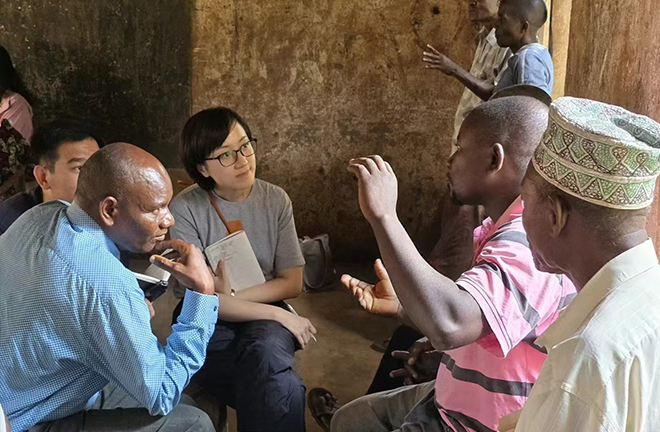Academics share China’s development experience through fieldwork

A scene of the field survey Photo: PROVIDED TO CSST
From late July to early August, a research team specializing in international development from China Agricultural University (CAU) conducted a two-week field investigation in rural Tanzania. Actively engaging in in-depth academic exchanges with various departments of the Tanzanian government, as well as think tanks and other institutions in the country, CAU scholars shared China’s successful experience in agricultural development, rural governance, and poverty reduction, while exploring new spaces and pathways for expanding China-Africa agricultural cooperation with their Tanzanian counterparts.
The field research project can be traced back to 2011, when CAU launched a China-Tanzania village-level poverty reduction learning center. This initiative aimed to share China’s valuable experience in agricultural development and poverty reduction, thereby enhancing Tanzania’s capabilities in agricultural production and management. More than a decade later, the project has shaped a practical system for agricultural cooperation, centered around two key programs: “small technology, big harvest” and “small beans, big nutrition.”
These programs have built an efficient local agricultural science and technology system, and advanced an agricultural development model marked by tripartite cooperation among universities, local governments, and farmers. This approach has gradually established a sustainable mechanism for agricultural development and poverty reduction. By integrating the resources and administrative forces of universities, think tanks, and governments at all levels in Tanzania, the programs have demonstrated the feasibility of the Chinese model, where government support drives agricultural development and poverty reduction, promoting international exchange and dissemination of Chinese experience.
Li Xiaoyun, the initiator of the project and a senior professor of liberal arts at CAU, told CSST that growing corn in Africa exemplifies China’s active engagement in global affairs as a member of the global village. It also reflects China’s commitment to integrating into the world, sharing its experiences, and taking on global responsibilities.
Xu Xiuli, a professor from the College of Humanities and Development Studies at CAU, explained that the recent field research trip to Tanzania sought to review the decade-long progress of the “small technology, big harvest” and “small beans, big nutrition” programs
from the Chinese perspective, and explore their implications. In her view, the China-assisted agricultural technology programs have not only responded to the specific needs of the partner countries, but also left deep, unique imprints of Chinese experience. This collaboration represents a blend of local development experiences from both sides, creating new pathways and practical opportunities for bilateral exchanges.
Overseas practical programs play a crucial bridging role, facilitating the bi-directional exchange of development experience and knowledge among Global South countries. Xu emphasized that the core of China-Tanzania development cooperation lies in collaboration on agricultural technology and the diffusion of innovation. Anchored in the indigenous characteristics of Tanzania, these programs integrate local experiences while applying the philosophy of extensive consultation, joint contribution, and shared benefits upheld by China. By “transplanting” China’s agricultural development and poverty reduction expertise and “cultivating” it in Tanzania, such projects have not only spread Chinese experience but also created fertile ground and ample space for the germination of new knowledge and theories.
Two-way interaction is essentially about communication and understanding between people. Over the past few years, China and Tanzania have shared information through frequent visits, as well as through online groups in the Chinese instant messaging app WeChat. This has built a comprehensive interaction network spanning from the central to local governments, and from elites to ordinary citizens, Xu said. Such in-depth communication has enhanced mutual understanding of each other’s historical and cultural genes, economic development models, and primary-level governance frameworks, laying a solid foundation for subsequent collaborations.
In Li’s opinion, these aid programs and campaigns have not only delivered tangible benefits and changes to Tanzania, but also offered valuable opportunities for China to learn and adjust their perspectives. Amid ongoing communication, Chinese scholars have embraced diverse opinions and feedback to optimize their working models and strategies, thereby facilitating their undertakings in Tanzania and enabling Chinese experience to take root and sprout.
Edited by CHEN MIRONG
